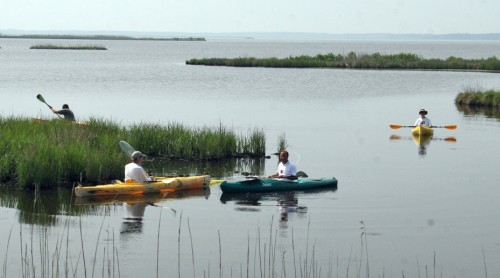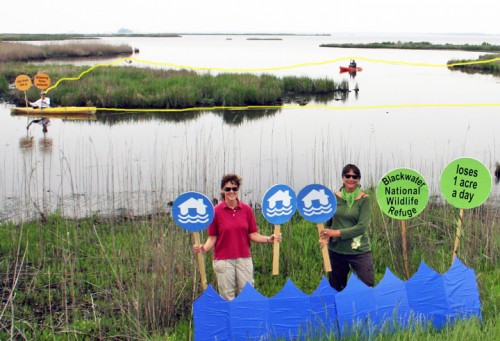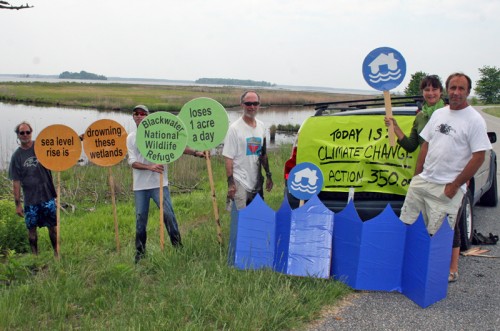Connect the Dots climate action day at Blackwater
Jane Hawkey · | Environmental Literacy | Science Communication |Organized by 350.org, the global climate action day Connect the Dots event at Blackwater National Wildlife Refuge on Sat May 5 was a great success.
In advance of the event on May 4, we had a little local press coverage - Maryland Daily Record and Baltimore Sun - via a telephone conference call arranged by Mike Tidwell of the Chesapeake Climate Action Network. This was my statement:
From the perspective of a scientist, I would like to just touch briefly some of the facts of climate change in Maryland. Sea level in Maryland rose by 1 foot in the 20th century. As a result, Maryland has experienced considerable shoreline erosion and deterioration or loss of coastal wetlands. And sea-level rise is very likely to accelerate, inundating hundreds of square miles of wetlands and land on the Eastern Shore. Projections that include accelerating the melting of ice would increase the relative sea level along Maryland’s shorelines by more than 1 foot by mid-century, and 3 feet by late 21st century, if greenhouse gas emissions continue to grow. If sea level rises by 3 feet, most tidal wetlands would be lost.
Sea-level rise will impact the mid-Atlantic states harder than anywhere in the US, and no where is it more evident than in Dorchester County on the Eastern Shore of Maryland. Projections put the County’s tidal marshes, and in particular those of Blackwater National Wildlife Refuge, in jeopardy.
The Refuge has been losing on average 1 acre of land per day to inundation and erosion from rising sea levels and land subsidence. In an effort to mitigate these impacts, a Blackwater Climate Adaptation Project has been initiated to try to protect and rebuild marshes.
From the perspective of a concerned citizen, we need to do more to fight the effects of global warming, which reach far beyond Blackwater. It is already impacting our homes and businesses, schools and highways every time a strong coastal storm lines up with a high tide. Outside of St Michaels, I have seen the first floors of my neighbors waterfront homes under water. In Easton, I have paddled my canoe across the flooded pavement of a public parking lot after a storm surge brought sea levels well upshore. I have seen a fire station outside of Cambridge completely surrounded by floodwaters, preventing their ability to respond quickly to fires. We need our Congressmen to act now to reduce greenhouse gas emissions by directing our energy policy away from fossil fuels and toward clean, green energy sources.
On Saturday, May 5 at Blackwater National Wildlife Refuge, while I handed out IAN Press newsletters Maryland at Risk to curious passersby, our group of kayakers roped off approximately 1/2 acre of wetlands to demonstrate only half of the full acre that is lost each day at Blackwater (Dixie Birch, BNWR, 2008). Hopefully, Saturday's climate change action events all over the world will draw attention to the threats of global warming as we ask our legislators to move away from fossil fuel energy sources and enact a renewable energy program.


